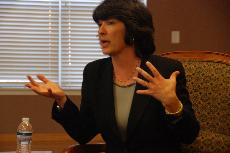“It’s an incredible new moment on whose threshold we stand,” said chief CNN international correspondent Christiane Amanpour in her Bryan Series speech at the War Memorial Auditorium in Greensboro on Nov. 18.Amanpour began by discussing the results of the presidential election and the public’s reaction.
“I was amazed at the outpouring of excitement and ownership,” said Amanpour. “It seemed to be like the atmosphere of the first ever election in Afghanistan or Iran.”
She also remarked on her surprise at the international response. “I said to myself, ‘my goodness, when was the last time we saw people take to the streets to celebrate America instead of take to the streets to demonstrate and burn her flag?’ ”
Amanpour, whose father was Iranian and who grew up in Tehran, and her husband, political commentator James Rubin, spoke about U.S. foreign policy and how Barack Obama’s election will affect the country’s relationship with the rest of the world, particularly Iran.
“There needs to be a dramatic change to get the U.S. and the world working together again,” said Rubin. “It will be a dramatically different situation when we can talk about our president representing what the Statue of Liberty meant to the thousands of people that came through Ellis Island.”
Amanpour also elaborated on the role of journalists in the current times and called for change, away from “citizen-journalism” and back to more fact-based reporting.
“So much of our news over the last several years has devolved,” said Amanpour. “It’s more important than ever to stick to the principles, which is to stay rooted in fact.”
Students had mixed feelings about their lectures.
“They didn’t tell me anything I didn’t know from keeping up with politics,” said junior Tim Bradley. “Most of the things they were talking about Obama I already knew because the BBC keeps up with that.”
“I thought it was interesting just to hear from another perspective, having it come from a woman who has seen it and heard it from other perspectives and has come to tell us, not just the American one,” said first-year Justin Big Hair.
Sophomore Tova Dinkin disagreed with Amanpour and Rubin’s hope for the new administration.
“I don’t really have a lot of faith in the country, therefore I don’t have a lot of faith in Obama. I think he’s a lot of talk,” said Dinkin. “The people who want change are not the people we need to change.”
Amanpour’s visit to Guilford was preceded by a seminar hosted by The Friends of the Library entitled “What Do the Election Results Mean for U.S. Foreign Policy?” on Nov. 16 in the Hege Library Art Gallery.
The seminar featured Assistant Professor Kyle Dell and Associate Professor Ken Gilmore. They guided a discussion of current foreign policy, hopes for Obama’s administration and how the president-elect will handle international relations.
“He (Obama) tends to deemphasize terrorism as one issue among many,” said Gilmore. “That’s not to say terrorism isn’t important, but it’s a law enforcement issue, not something you blow people up for.
“It’s unlikely that Obama’s foreign policy will be transformational. His rhetoric is more transformational than the reality he will face.

